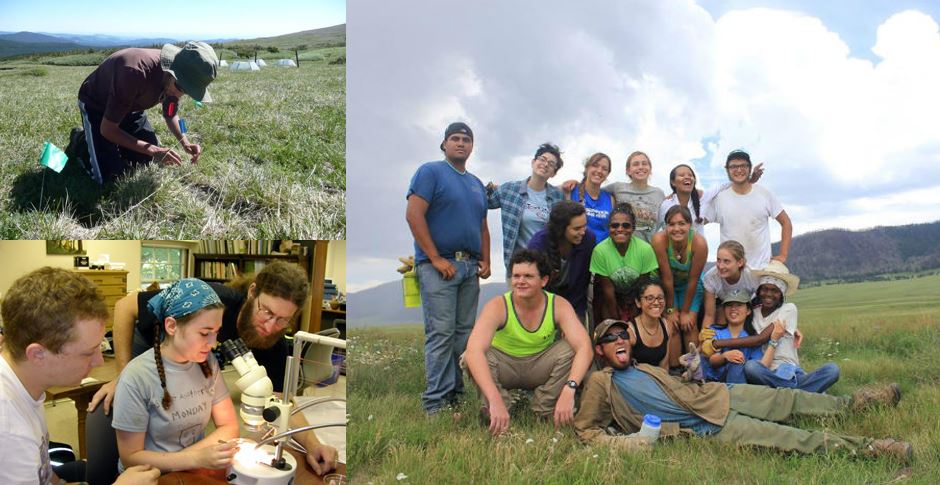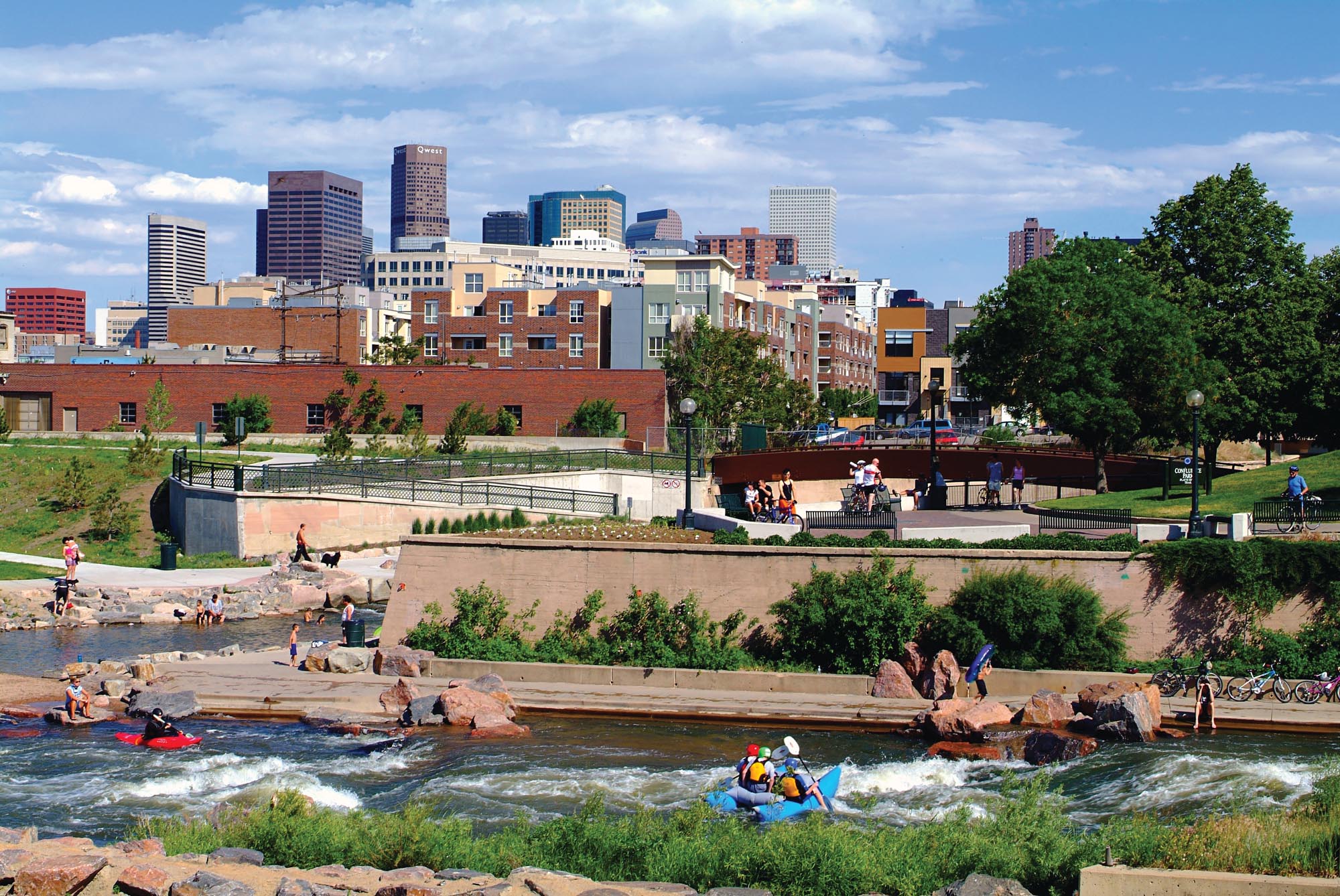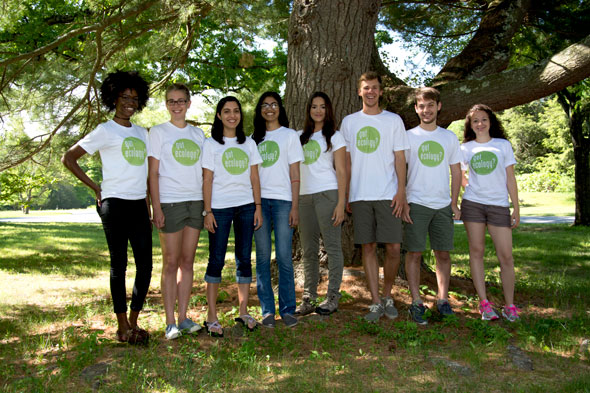NSF funds a large number of research opportunities for undergraduate students through its Research Experiences for Undergraduates (REU) Sites Program. The REU program allows for active research participation by undergraduate students in any of the areas of research funded by the National Science Foundation. Each student is associated with a specific research project, where he/she works closely with the faculty and other researchers. So if you are an undergraduate student interested in gaining meaningful research experience, consider applying for a summer REU opportunity.
In addition to the REU program, students also have the opportunity to gain research experience through the Partnerships for Undergraduate Research (SPUR) Fellowship. SPUR Fellowships are sponsored by SEEDS, a program of the Ecological Society of America, with the goal of broadening participation in ecology. The award supports the undergraduate student in designing and conducting an ecology research project of interest. SEEDS has established partnerships with field stations and mentors to offer exciting summer opportunities that will be tailored to meet student interests, career objectives, and growth as a scientist. For most opportunities, no prior research experiences is necessary.
Below is a list of summer research opportunities associated with the Long Term Ecological Research (LTER) Network.
Upper left: Niwot Ridge LTER REU student; Lower left: Harvard Forest LTER undergraduate summer research program; Right: 2015 Sevilleta LTER Research Experience for Undergraduates Program
Summer 2017 REU Opportunities
- Sustainable Urban Water Transdisciplinary Research Program for Undergraduates (BES/UWIN)
- Apply by February 10, 2017
- Translational Ecology: Independent Research in Ecology for Undergraduates (BES/SPUR)
- Apply by February 3, 2017
- SPUR Fellowship: Central Arizona-Phoenix Long-Term Ecological Research Program REU (CAP/SPUR)
- Apply by January 16, 2017
- SPUR Fellowship: Ecological and Evolutionary Dynamics in a Changing World (KBS/SPUR)
- Apply by January 16, 2017
- Harvard Forest REU Program (HFR)
- Apply by February 3, 2017
- Kellogg Biological Station LTER REU Position (KBS)
- Apply by March 10, 2017
- Sevilleta REU Program in Aridland Ecology (SEV)
- Apply by February 24, 2017
Sustainable Urban Water Transdisciplinary Research Program for Undergraduates
The Urban Water Innovation Network (UWIN) is pleased to offer its second Undergraduate Research Program (URP) for the summer of 2017. Students with different research interests in urban water sustainability – social sciences, natural sciences, engineering – will be placed with a team of mentors at institutions in urban areas across the nation. See: https://erams.com/UWIN/urp/
Students will join the Urban Water Innovation Network community in 2017 to:
- Be a part of an exciting research community, working closely with mentor scientists
- Design and complete a research project using state-of-the-art facilities
- Explore urban water sustainability and transdisciplinary research
- Exchange ideas with a diverse group of students and scientists
The program fosters reflection and builds self confidence and skills. To complement their mentored research, students interact in person and/or virtually, give and receive feedback and support, and participate in a rich assortment of enrichment activities, workshops and seminars in research and urban water sustainability.
Dates: May 31 to August 2, 2017 (9 weeks)
Eligibility: Undergraduate freshmen, sophomores, juniors or first semester seniors. Must be citizens or permanent residents of the U.S. or its possessions.
Support: $4,500 stipend, room and board on-campus or in nearby housing, travel allowance up to $900.
The program starts and ends at Colorado State University in Fort Collins CO.
To apply: See our website at: https://erams.com/UWIN/urp/ Online application only.
Applications must be submitted by February 10, 2017.
Projects for 2017:
- Variation in Vegetation’s Influence on Urban Climate (University of California Riverside, Oregon State University, University of Arizona, UMBC)
- Evaluating Options for Management of Urban Flood Hazards (UMBC, University of Arizona, University of Georgia)
- Microclimates and Human Activity Patterns Near Urban Surface Water: A Case Study of Tempe Town Lake, Arizona (Arizona State University)
- Water Resouces and Heat Emergencies (Arizona State University)
- Natural Solutions for Urban Watershed Sustainability (Brooklyn College CUNY)
- Visualizing Urban Water Sustainability Indicators within a Video Game for Collecting Water Management Ideas from Gamers (Colorado State University)
- Non-Darcian Flow Regimes in the Biscayne Aquifer of Southeast Florida (Florida International University)
- Water Affordability Case Studies (Michigan State University)
- Transitions to Socially Equitable and Environmentally Just Sustainable Urban Water Systems (Northeastern University)
- Characterizing the Urban Energy Water Nexus through Modeling and Data Analysis (Princeton University)
- System-of-Systems Analysis of Water Infrastructure Resilience under Climate Change Impacts (Texas A&M University)
Translational Ecology: Independent Research in Ecology for Undergraduates
2016 REU students
The Cary Institute of Ecosystem Studies is pleased to offer their Research Experiences for Undergraduates (REU) program for the 30th year in 2017. Ten undergraduate students will join the Cary Institute research community in 2017 to:
- Be a part of an exciting research community, working closely with leading ecologists
- Design and complete a research project using state-of-the-art facilities
- Exchange ideas with a diverse group of students and scientists
- Learn how to translate ecology for policy, management and the public
- Publish results in our online Cary Institute Undergraduate Research Report
- Explore how ecological research impacts society
The program emphasizes the community nature of the scientific enterprise, fosters reflection and builds self confidence and skills. To complement their mentored research, students have many chances to interact, give and receive feedback and support, and participate in a rich assortment of enrichment activities, workshops and field trips around the theme of translational ecology.
Dates: May 22 to August 11, 2017 (12 weeks)
Eligibility: Undergraduate freshmen, sophomores, juniors or first semester seniors. Must be citizens or permanent residents of the U.S. or its possessions.
Stipend: $6,300 stipend, plus a $900 food allowance and free housing in Bacon Flats Lodge.
Other support: Assistance is available for travel to and from the program as well.
To apply: See our website at: http://www.caryinstitute.org/students/reu-program
Projects for 2017:
- Eavesdropping behavior and social information use in songbirds
- The scavenger community in a temperate northeastern forest
- Nutrient retention in forest soils
- Long-term consequences of high deer abundance on forest community structure and nutrient dynamics
- Ecosystem regulation of mosquitoes and disease risk
- Trans-boundary ecosystem effects of larval abiotic conditions on adult mosquito population dynamics
- Hudson River habitats in a changing world
- Lakes in a changing global environment
- Ecological change in the Sky Lakes on the Shawangunk Ridge
- Using a whole-lake experiment to understand how environmental change alters lake food productivity
- Children’s learning and engagement in ecology
SPUR Fellowship: Central Arizona-Phoenix Long-Term Ecological Research Program REU
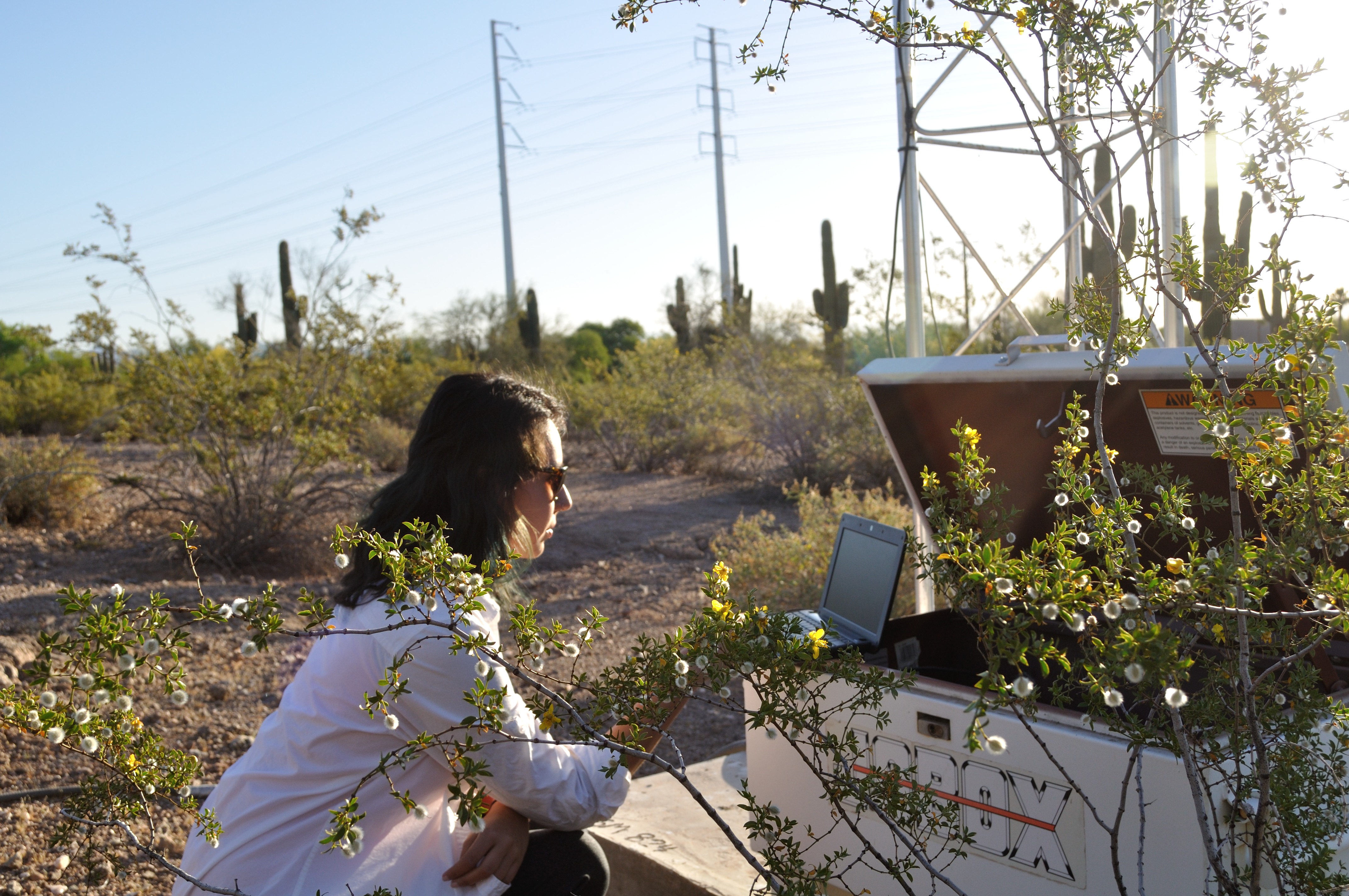
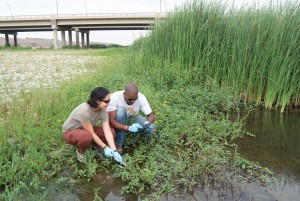
The Centeral Arizona-Phoenix Long-Term Ecological Research Site at Arizona State University is a partner research site with the SPUR Fellowship. As a fellow, you will have the opportunity to develop a question for your stufy, write a proposal, develop the methodology, conduct the study, and analyze results, thereby concluding a mini-thesis by the time you complete your summer. You may also have the opportunity to present your research on-site at the end of the summer. Regardless of your research focus, you may also have the opportunity to assist and implement site-based outreach activities to develop your skills in planning and executing events and educational programs. Additional career development activities are also provided at most locations. Learn more about the SPUR Fellowship: http://esa.org/seeds/fellowship/.
Description: The REU experience in the Central Arizona-Phoenix Long-Term Ecological Research (CAP LTER) program is structured to be a learning opportunity for undergraduate students to work with CAP senior scientists on urban ecology research projects in the greater Phoenix area. REU students take responsibility for a research project and are expected to produce a research poster and possibly to co-author a paper within a year of completing their experience. Past REU students have worked on a range of research projects: soils in residential landscapes, the urban heat island and vegetation, residents’ attitudes about vegetation and birds, arthropod communities in urban and desert patches, and nutrient cycling in wetlands, retention basins, and floodplains. All projects build off of CAP’s long-term research in the Phoenix area and involve students in gathering and analyzing data to answer research questions. Many projects involve both field and lab work. REU students also gain an opportunity to work with senior graduate students and engage in peer to peer learning with other undergraduate students. Learn more about the CAP LTER REU: http://esa.org/seeds/asu/.
Location: Tempe, AZ
Start and End dates: 5/9/2017 – 8/8/2017
Fellowship positions available: 2
Are the dates flexible? Yes
Eligibility and Requirements: GPA 3.0 and above
Other restrictions: Rising sophomores, juniors, and seniors.
Summer Stipend: $4,000 total
Other services provided: Housing is provided. Air fare/ mileage is provided. Ground transportation on site is provided if needed. Research materials or equipment are provided. We have career development / awareness activities in place.
To apply: see application guidelines and apply at http://esa.org/seeds/fellowship/
Applications must be submitted by January 16, 2017.
SPUR Fellowship: Ecological and Evolutionary Dynamics in a Changing World
The W.K. Kellogg Biological Station Long-Term Ecological Research Site at Michigan State University is a partner research site with the SPUR Fellowship. As a fellow, you will have the opportunity to develop a question for your stufy, write a proposal, develop the methodology, conduct the study, and analyze results, thereby concluding a mini-thesis by the time you complete your summer. You may also have the opportunity to present your research on-site at the end of the summer. Regardless of your research focus, you may also have the opportunity to assist and implement site-based outreach activities to develop your skills in planning and executing events and educational programs. Additional career development activities are also provided at most locations. Learn more about the SPUR Fellowship: http://esa.org/seeds/fellowship/.
Description: The Kellogg Biological Station (KBS) provides outstanding opportunities for students interested in ecology, evolutionary biology, agricultural ecology and animal science. KBS faculty, post-docs, and graduate students are passionate about involving undergraduates in their research and KBS provides access to excellent research facilities, field sites, and an environment conducive to research. KBS REU positions give undergraduate students the opportunity to conduct full-time research under the guidance of an experienced mentor.
REUs will work with their mentor to create and maintain a fully annotated dataset, collaborate to write a research proposal, present a professional research poster at the KBS Summer Undergraduate Symposium, and write a blog post about their research experience.
What are the benefits of an REU at KBS?
- Join a dynamic group of students and faculty for an authentic field research experience
- Learn the process of research: reading the literature, formulating questions and hypotheses, designing a study, collecting and analyzing data, and presenting the results as a professional research poster
- Explore if a career in research is a good choice for you
- Build references for your application to graduate school or other programs
- Participate in professional development seminars tailored to help undergraduate students be successful in STEM disciplines
Location: Hickory Corner, MI
Start and End dates: 5/22/2017 – 8/6/2017
Fellowship positions available: 2
Are the dates flexible? No
Eligibility and Requirements: Students must be a US Citizen enrolled as an undergraduate at a US college/university.
Summer Stipend: $5,000 stipend plus FREE room and board. Up to $500 to cover transportation to and from KBS. Up to $400 for research expenses
Other services provided: Housing and meals are provided, Air fare/mileage is reimbursed up to $500, ground transportation to KBS is provided if needed, up to $400 can be used for research materials, there are weekly professional development seminars and opportunities to interact with visiting scientists.
Description of research projects:
- Nitrogen in the Environment and Critical Climate Change Impacts
- Will work for fertilizer: Plant roots trade food to soil bacteria for fertilizer
To apply: see application guidelines and apply at http://esa.org/seeds/fellowship/
Applications must be submitted by January 16, 2017.
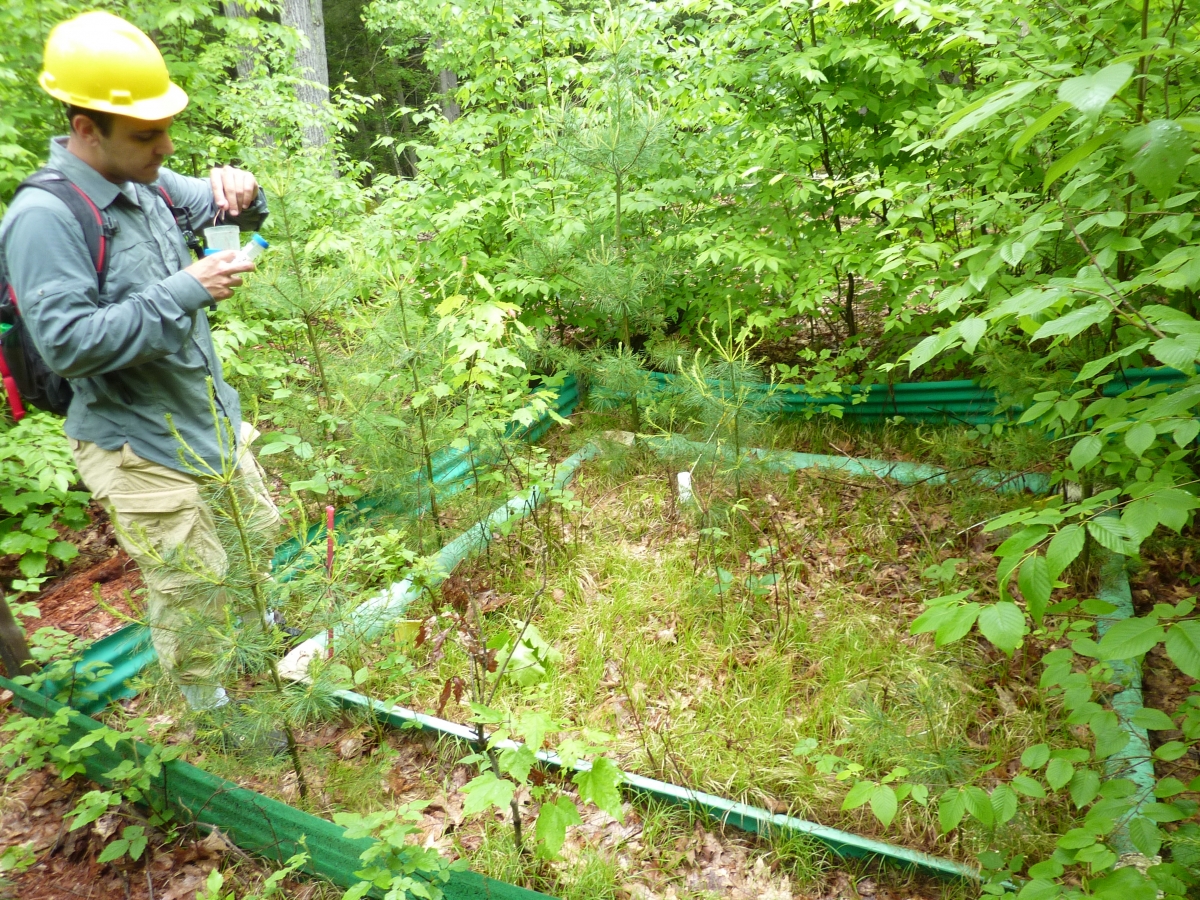
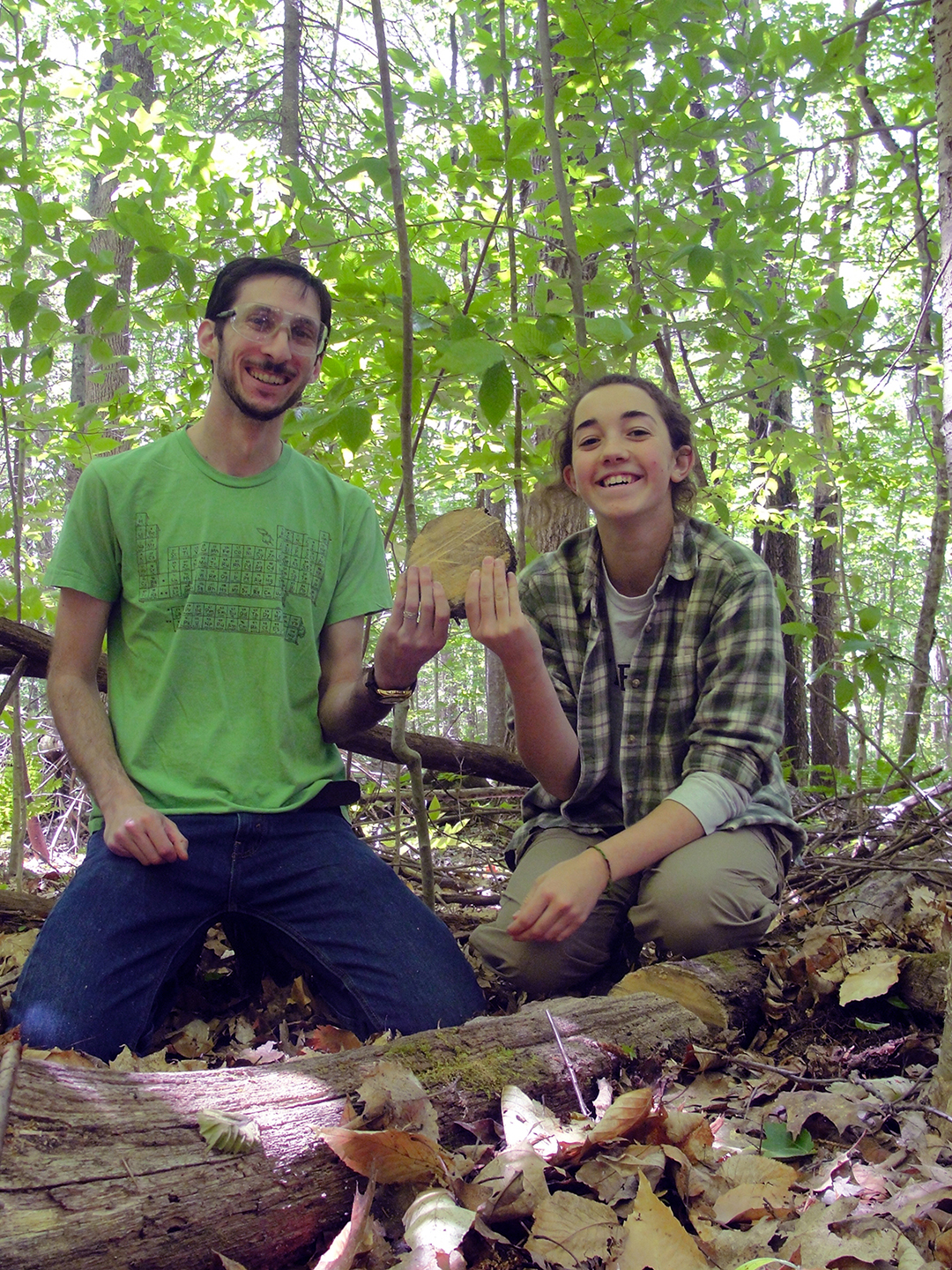
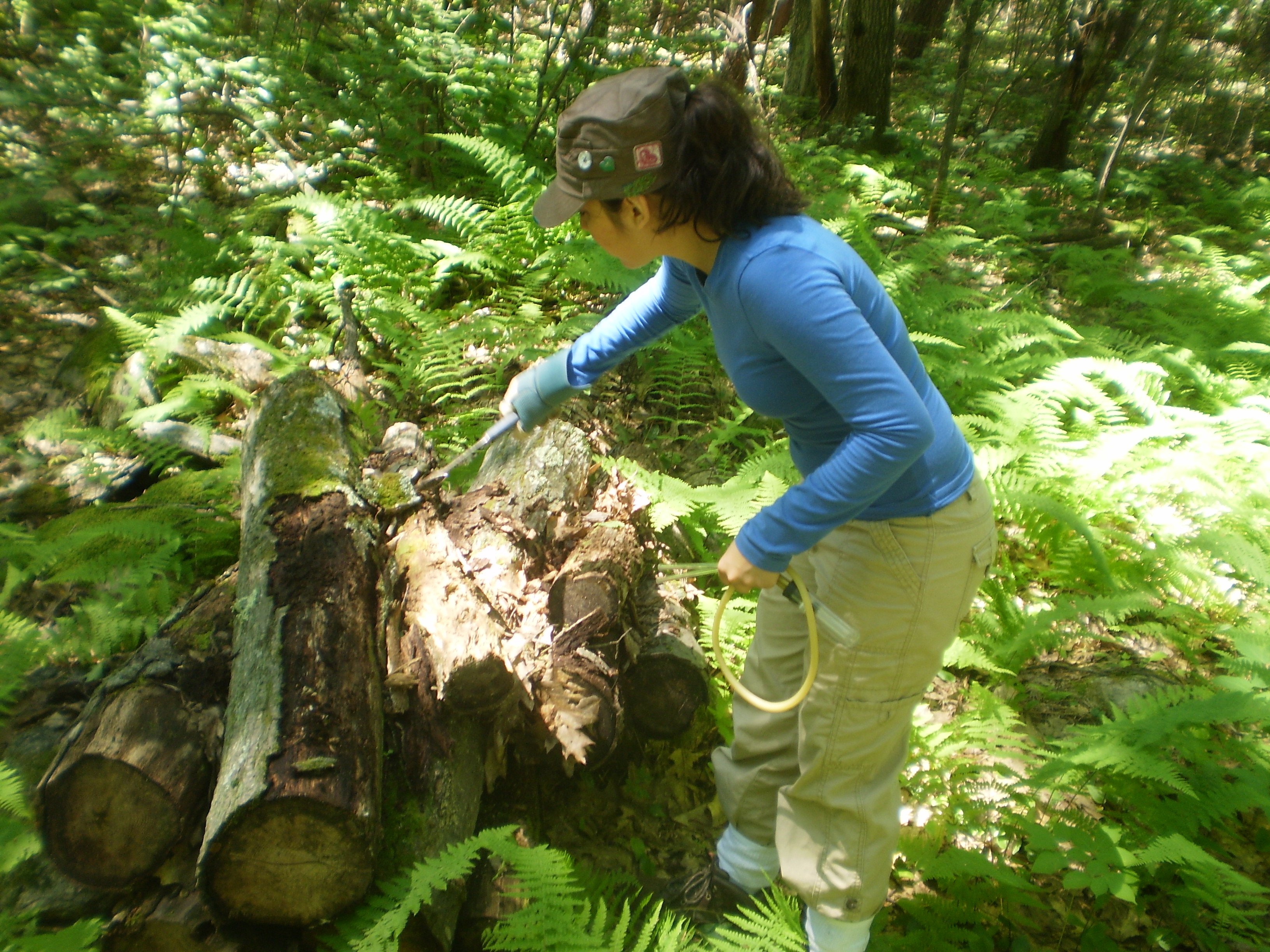
The Harvard Forest Summer Research Program in Ecology is an opportunity for students to participate in 11 weeks of mentored, paid, independent research focusing on the effects of natural and human disturbances on forest ecosystems, including global climate change, hurricanes, forest harvest, wildlife dynamics, and species diversity. Researchers come from many disciplines, and specific projects center on population and community ecology, paleoecology, land-use history, biochemistry, soil science, ecophysiology, atmosphere-biosphere exchanges, landscape modeling, and data provenance (see 2017 research projects and 2016 student abstracts). Read student experiences from past summers on our blog.
Where is the Harvard Forest? The Harvard Forest is located in the town of Petersham, in Western Massachusetts.
2017 Summer Program Dates: Monday, May 22 – Friday, August 4, 2017
Benefits
- Stipend of $5775 for the 11-week session
- Free furnished housing at Fisher House or Raup House
- Free full meal plan
- Travel reimbursement for one round trip to the Harvard Forest campus (federal grant restrictions apply)
To Apply: see application requirements and apply at http://harvardforest.fas.harvard.edu/education/reu-apply
Applications must be submitted by February 3, 2017.
Kellogg Biological Station LTER REU position
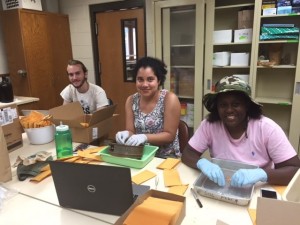
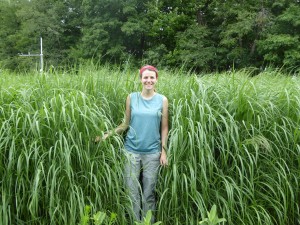
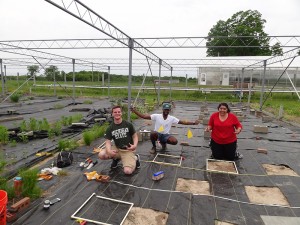
Mentors: Joe Lee-Cullin (PhD Candidate – Department of Earth and Environmental Science, Michigan State University) and Dr. Jay Zarnetske (Assistant Professor – Department of Earth and Environmental Science, Michigan State University)
What happens to carbon that moves between stream and groundwater ecosystems?
Background:
Carbon, particularly organic carbon, is a master variable in aquatic ecosystems, controlling nutrient and contaminant cycling, food webs, and drinking water quality. Organic carbon composition is complex and varies dependent upon its origin, and therefore what it does and where it ends up streams is still poorly understood. The area where surface and subsurface waters mix, called the stream-groundwater interface, is an important ecological environment that may play a significant role in how stream carbon moves and what it actually does. To date, this has not been studied much by scientists. This stream-groundwater interface creates strong physical and biological gradients that lead to a great deal of biological and geochemical activity that transforms and moves organic carbon, nutrients, and contaminants. In general, the organic carbon acts as an important energy source for microbial organisms existing in this interface, particularly those organisms involved in removing nutrients from the freshwater streams (for example, denitrification that can remove nitrate from streams). The result is that this interface has extremely large rates of solute transformation compared to other parts of the landscape. Our research group tries to understand the reactions that occur in the stream-groundwater interface, particularly the reactions that regulated the organic carbon entering and leaving this interface.
Research Project:
The student will spend the summer helping to develop and carrying out stream experiments in the Augusta Creek, a beautiful, mixed land use watershed near to the W.K. Kellogg Biological Station (KBS) in Hickory Corners, MI, part of Michigan State University. This project will assess how carbon from different land use areas (for example, an agriculturally dominated stream vs. a forested stream) is processed at the stream-groundwater interface. Specifically, a series of stream tracer experiments, using carbon treatments, will be completed in multiple sections of Augusta Creek. Throughout the course of this project the student will learn valuable theory about streams ecosystems and biogeochemistry and be responsible for, with mentorship, their own research project.
Through this project we will obtain some of the first evidence for how the stream-groundwater interface processes carbon from different sources and what it might mean for downstream ecosystems and water quality.
Student Experience & Responsibilities:
In addition to learning about streams ecosystems, the student will learn valuable field techniques, laboratory analyses, and simple modeling. Field work will include significant time in streams, conducting manipulation experiments and making hydrologic and biogeochemical measurements. Laboratory work will include dissolved organic carbon and dissolved ion quantification and characterization using state of the art chromatography and spectrometry instruments. The student will also have the opportunity learn simple numeric models that turn field experiments, such as tracer test data, into physically meaningful information. There will be multiple opportunities for the selected student to develop their own independent project and network with the students and faculty across the main and KBS campuses of MSU.
This research project lasts for 11 weeks, starting Monday, May 22 through Friday, August 4, 2017, working at least 40 hours a week. The student will be responsible for 1) meeting all requirements of their mentor, 2) writing a blog post about their research for the KBS LTER website, and 3) presenting a professional research poster at the KBS summer research symposium on August 2, 2017 at KBS.
The student will be based on, and live near, Michigan State University’s main campus in East Lansing with frequent trips to KBS for sampling. The student is responsible for securing housing in or near East Lansing, MI. The student will receive a $8000 stipend to support living expenses, travel to Michigan, and up to $500 for research supplies. Travel to the sampling stations will be covered by the mentor’s lab.
This project is funded by the National Science Foundation’s Kellogg Biological Station Long-term Ecological Research (KBS LTER) program. Priority will be given to non-MSU students who may not have many research opportunities at their college or university and under-represented minority students. Please note, students must be a U.S. citizen to apply.
To apply for this position, please submit: 1. a detailed resume (or Curriculum Vitae), 2. a cover letter that includes a personal statement of less than 1 page in length that discusses career goals, research experiences and aspirations, and your skills/attributes that are suited to support this research project, and 3. contact information for 3 professional references.
All application materials must be submitted to cullinjo@msu.edu and jpz@msu.edu by March 10, 2017.
Sevilleta REU Program in Aridland Ecology


Background
The Sevilleta Field Station is seeking applicants for Research Experiences for Undergraduates (REU). We are looking for 10 Biology REU students for the Summer of 2017. This interdisciplinary REU Site Program at the Sevilleta Field Station in central New Mexico will train undergraduate students who will conduct independent research under the guidance of UNM faculty in Biology, Ecology, Civil Engineering, and Earth and Planetary Sciences, along with scientists from Federal and State agencies. The summer program includes a seminar series, a weekly journal club, an annual symposium, professional development workshops, toastmasters, ethics training, field trips, and opportunities to interact with a multitude of scientists conducting research in the area. Students will conduct independent research in and around the Sevilleta National Wildlife Refuge (SNWR) and present their projects at the annual symposium to be held in early August 2017. Working at the Sevilleta Field Station and SNWR site invites close interactions among students, faculty, federal scientists, and graduate students.
Students will have numerous opportunities to share ideas and explore issues within and across disciplines. The program’s goal is to increase exposure to a large, multidisciplinary research program, inspire students to continue into professional careers, and prepare students for the rigors of graduate school, professional research, and responsible citizenship. The program exemplifies the integration of research and education. As students conduct research, they will learn how to be an independent scientist, along with many technical, methodological and ethical issues that arise in scientific research.
Compensation
Lodging and laboratory space for REU students will be provided by the UNM Sevilleta Field Station at NO COST to the student. In addition, candidates chosen will receive a stipend of $5500 and a $500 food allowance during the 10-week summer program that will run from May 29 – August 4. We will also refund travel costs to and from the UNM Sevilleta Field Station up to $600 (stipulations apply).
Application Requirements
Applications will be accepted from students at any stage of their undergraduate program (freshman to senior) and any discipline, so long as the applicant is interested in conservation biology and ecology in aridland environments. Students are not eligible if they have completed an undergraduate degree by the start of Summer 2017. We welcome applications from students at four year colleges, students early in their college career, students that are the first member of their family to attend college, non-traditional students, and students from traditionally underrepresented groups. Students must be U.S. Citizens.
General requirements for participation in the Research Experiences for Undergraduates Programs in the Biological Sciences are set by the National Science Foundation. These requirements are listed below: Applicants to the Sevilleta REU Program must be:
• Citizens or permanent residents of the United States or its possessions (e.g., Puerto Rico).
• Undergraduate students enrolled in a degree program (full- or part-time) leading to a Bachelor’s degree.
• Undergraduate students who are transferring from one institution to another but are not enrolled at either institution during the intervening summer may participate.
Students are not eligible if they are:
• Foreign nationals residing in a country other than the United States. • Students that have completed high school but have not yet enrolled in a degree program at an educational institution of higher learning. • Students that have completed an undergraduate degree and are no longer enrolled in a degree program at an educational institution of higher learning.
Requirements for the Sevilleta REU Program:
• The Sevilleta REU Program has no additional requirements. Applications will be accepted from students at any stage of their undergraduate program (freshman to senior) and any discipline, so long as the applicant is interested in conservation biology and ecology in aridland environments. • We are particularly interested in applications from students that have had limited opportunities to conduct independent research at their home institution. We welcome applications from students at four year colleges, students that are the first member of their family to attend college, non-traditional students, and students from traditionally underrepresented groups.
Application Guidelines
A completed application for the Sevilleta LTER Research Experience for Undergraduates Summer Program will consist of five items:
1. A complete online application (see below).
2. A resume.
3. An unofficial copy of your academic transcript. If accepted into the REU program, applicants will be required to provide an official copy before starting the program.
4. Two letters of recommendation. These can be from faculty advisors from the student’s home institution, mentors or previous employers. Recommendations from those that are able to comment on the applicant’s academic ability, initiative, maturity, and self-motivation are preferred. Please have your respondents email your letters of recommendation to srbaker@unm.edu WITH the subject line of “2017 REU Recommendation for YOUR NAME.”
5. A two-page essay addressing the development of the student’s interest in ecology, the specific areas of research interest, and current professional career goals. Career goals are not required to be in ecological research. Essays can be single or double-spaced but should be in a legible font (min. 11 point) with 1 inch margins.
The application form, resume, unofficial transcript, two-page essay, and letters of recommendation should be received by February 24, 2017. Questions regarding the application procedure can be directed to the Program Manager, Stephanie Baker by e-mail. Please put REU 2017 in the subject line.
TO APPLY AND FOR MORE INFORMATION visit: https://sevilletareu.wordpress.com/
Applications must be submitted by February 24, 2017.

